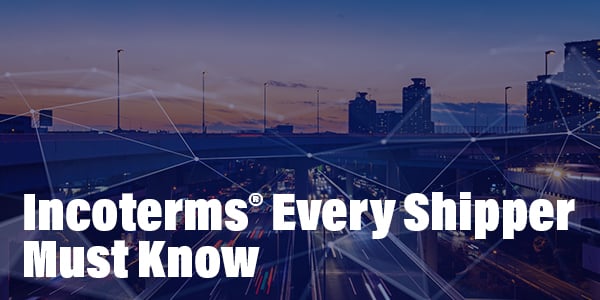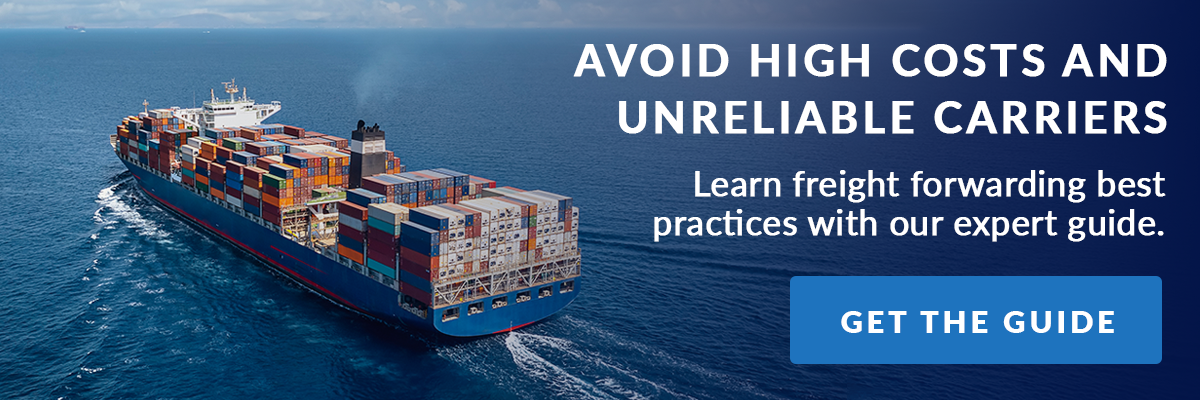
Understanding the language of shipping is a strategic advantage. In this article, we'll introduce you to the latest Incoterms®, a set of rules and regulations that will keep you at the cutting edge.
Incoterms®, a shorthand for International Commercial Terms, is a list of essential terms used in importing and exporting. The International Chamber of Commerce (ICC) created this series of commercial terms to outline the rights and duties of the legal entities involved in transferring goods.
Incoterms® rules define international terms of sale. The ICC updates the list every ten years, and it released the most recent updates on January 1, 2020.
Incoterms® 2020 lists 11 trade terms that range from Ex Works (EXW), which puts the least amount of responsibility and risk on the seller, to Delivery Duty Paid (DDP), which puts the most responsibility and risk on the seller.
The 2020 Incoterms® updates mostly clarify existing rules. Shippers need to understand these rules to correctly identify in which situations buyers and sellers bear specific costs and responsibilities.
How Free Carrier (FCA) Changed in 2020
The most significant change to Incoterms® pertains to Free Carrier (FCA). FCA involves situations where the seller loads goods onto the buyer's transport at the seller's premises or where the seller delivers goods to another agreed-upon location.
Historically, carriers only gave an onboard bill of lading to the person paying it, causing many sellers to select Free on Board (FOB) for their carrier shipments. With FOB, sellers assume all risks and costs for the export but lose control of their containers once they arrive at the export port. Before 2020, FOB was the only way for sellers to receive an onboard bill of lading, which they needed to secure credit from the bank. The new terms of FCA now stipulate that the seller gets the onboard bill of lading.
The change in who receives the onboard bill of lading encourages sellers to use FCA instead of FOB for container shipments.
Insurance Changes in the 2020 Ruling
The 2020 rules also altered Incoterms® related to insurance coverage levels for Cost Insurance Freight (CIF) and Carriage and Insurance Paid To (CIP).
With CIP, the seller maintains responsibility for delivering goods to the carrier, including the cost of carriage and insurance. Sellers bear the same responsibilities with CIF but can only use CIF in maritime transport.
Under the 2020 rules, CIF insurance requirements remain the same as in 2010, but the ruling increased required insurance levels for CIP to at least 110% of the goods' value.
Moving from DAT to DPU
The 2010 rules defined DAT as Delivered at Terminal. With DAT, the seller clears goods for export and remains responsible for the goods until they arrive at the destination terminal when the buyer unloads them. Sellers can choose DAT for any form of transportation.
The 2020 rules changed DAT to Delivered at Place (DPU). DPU allows more flexibility to deliver goods to locations other than the destination terminal, but overall, the rule remains the same.
Other Changes to Pay Attention To
Incoterms® 2020 also included changes to security and to carriage and costs.
The rules now offer greater flexibility for pre-carriage and on-carriage with FCA, DAP, DPU, and Delivered Duty Paid (DDP) when shippers or consignees own their own trucking service.
Incoterms® 2020 also provides more detail around security allocations and costs. The new rules recognize that security-related terms are more prevalent in trade and provide for security-related obligations at A4 and A7 of each rule.
Traditionally, carriers and airlines charge a fee or surcharge for security. Incoterms® 2020 details each rule's security requirements and specifically identifies whether the buyer or seller pays for it. For instance, CPT (Carriage Paid To) now requires the seller to comply with security-related transport requirements and cover the associated costs.
Essential Terms to Know
Here are several Incoterms® and definitions to help shippers stay informed as they select how best to manage imports and exports:
- ExWorks (EXW): The seller makes the product available at a designated location, and the buyer incurs transport costs.
- Delivered Duty Paid (DDP): The seller arranges carriage and delivery of goods to a destination, clears goods for import, and pays all applicable taxes and duties. Risk transfers to the buyer once goods arrive and are available for unloading.
- Free on Board (FOB): Sellers assume all risk and costs for an export, but the buyer takes over the containers and risk once they arrive at the port of export.
- Free Carrier (FCA): The seller holds responsibility for packaging and loading goods at the port. The buyer then ships the goods, unloads them at the buyer's port of choice, and transports the goods to the final destination.
- Delivered at Place (DAP): The seller delivers goods, prepares for unloading at an identified destination, and assumes all risks for delivery and prep. Buyers assume the risk and cost of unloading.
How to Select the Right Incoterm®
Choosing the Incoterm® rule that fits your shipping depends on location. While it's best to get Customs advice from a logistics professional, here are some general guidelines that may help.
Choose FOB, FCA, or EXW when buying and selling in the United States or Canada. These three Incoterms® provide the most control over goods. With EXW, sellers must have goods ready for collection at an agreed-upon place of delivery (the seller's factory, mill, plant, or warehouse).
Buyers and sellers in Western Europe benefit from EXW as Western Europe, and the United States have similar Customs regulations related to the Foreign Corrupt Practices Act (FCPA). In other parts of the world, FOB and FCA make more sense.
Many countries do not adhere closely to FCPA, so when importers use EXW, they pay for export Customs clearance. In places where corrupt practices rule, it's best to use FOB or FCA, which requires the seller to pay for export Customs clearance.
Related Content: FOB vs. Exworks Incoterms
Hire a Partner to Protect Your Shipments
Incoterms® are complex, and selecting the right one for your shipment requires the support of a knowledgeable expert.
A qualified logistics provider will help you nail down landed costs by selecting the correct Incoterms® rule for your shipments. They can assess your unique situation and advise you on Incoterms®, specifically evaluating your risk and determining what cover and control must be in place before moving forward.




